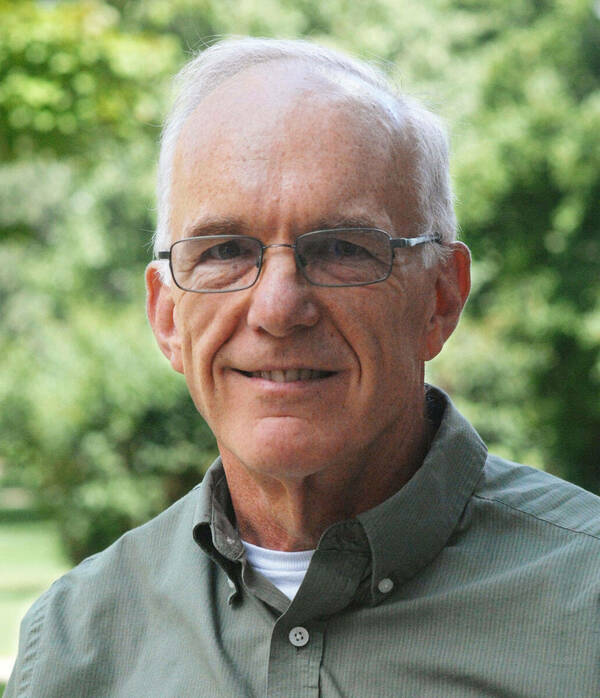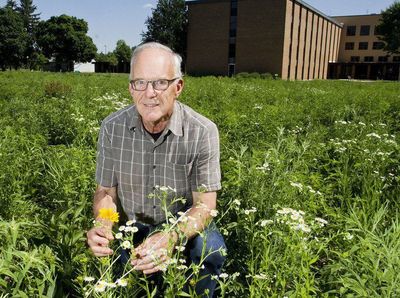

"How can you live in the world without being environmentally literate?" Dr. Luke Gascho's seemingly simple response to the question of why environmental education is important underscores the themes that several Notre Dame sustainability students explore for their capstones on environmental education.
Dr. Gascho, Executive Director Emeritus of Merry Lea Environmental Learning Center of Goshen College, goes on to explain that the concept of humans as separate from nature is central to many of the problems of environmental degradation we face today. "Humans are part of the ecological systems upon which we depend and understanding how these systems function is critical to understanding how we fit within them."
"We were motivated to invite Dr. Gascho to lead an environmental education workshop by our students," said Dr. Rachel Novick, Director of the Sustainability Minor. "They understand the importance of this topic and they have a passion for sharing their knowledge with others. Dr. Gascho's three-part clinic this fall helped a number of our seniors deepen their research and introduced students from a variety of academic programs to this field."
As Karli Siefker '21 puts it, "Environmental education is thus necessary to connect students to nature, providing the fundamental relationship between humanity and Earth, and teaching students of the mutual dependence in this relationship." Karli is a Theology major with minors in Sustainability and Education, Schooling and Society. She is one of five Notre Dame Sustainability Minors focusing on environmental education for their senior capstone projects. Together with Biology and Peace Studies major Elsa Barron '21, Karli has designed and implemented an environmental science program focused both on access to nature and environmental justice, at DePaul Academy. This is a residential school for teenage boys within the juvenile justice system and it provides a more restorative alternative to traditional incarceration.
"Nature can be incredibly important for mental health and trauma healing which is the process DePaul is trying to lead the students through in their nine months there," Elsa says. Karli and Elsa join DePaul's biology course virtually once a week to lead the students through hands-on lessons, from planting a seed or examining fall leaves to having conversations about environmental justice within their communities.

The mental health benefits of nature are also central to Anna Kong's sustainability capstone project, creating the landscape design for an environmental education-focused high school in Seattle, which she is designing for her architecture thesis. Her site is on the waterfront in Seattle, surrounded by a multitude of ecosystems and geological formations which make for ample learning. The challenge is constructing the campus to best facilitate this learning as an integral part of a high school curriculum.
Many of the precedents for such programs are either outdoor adventure programs or they're for younger students. However, Anna is excited to develop an environment-focused high school because she sees both the mental and physical health benefits of being outside as particularly valuable for high school-aged students. This work is important to her because "The future will be determined by the next generation of change-makers." She acknowledges this may seem cheesy but emphasizes that it doesn't make it any less true.
This commitment to the next generation is evident in each of these capstone projects and both Matty Aubourg '21 and Rachel Wittmer '21 also highlight that environmental science is not traditionally prioritized in curriculums. They're developing a food access and sustainability curriculum for fourth graders, weaving together topics related to climate change, food waste, food security, social justice, and more. The curriculum will culminate with the students visiting a local food rescue program, to put the lesson together with a hands-on experience.
"Climate change and food insecurity are concepts that the youth should be exposed to because it directly affects their futures," Matty says. Rachel, a Business Analytics major, and Matty, who is studying Environmental Science, are hoping they can provide a fun, meaningful introduction to at least one class of students, contributing to a broader shift towards including more environmental sciences in classrooms. "Hopefully, this curriculum will offer students an optimistic view towards sustainability, as they recognize changes they can make in their own diets to have real impacts on their environmental footprint," Rachel says.
Building these relationships, highlighting these connections between people and natural systems, is essential to solving many of today's problems according to Dr. Gascho. He notes that taking time to learn about and understand one's local environment provides transferrable skills that also apply to broader problems. His advice for aspiring environmental educators is to start by asking themselves "How should the participants be different after this experience?" With this intentionality, educators have an opportunity to develop activities that speak specifically to their audience, which can in turn inspire true change.
Dr. Gascho describes his as a "joyful career," attributing this to his ample opportunities to see students change, and apply their new knowledge in so many ways, while at the same time continuously learning himself from his fellow educators and his students.
View recordings of the Environmental Education Clinic series here.